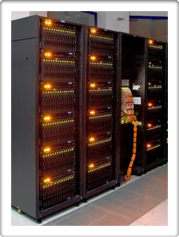Research

LINKS AND NEWS
Upcoming
conferences
GRAD PHD STUDENTS
1. Francico Corbera (2001)
2. Adrián Tineo (2009)
3. Rosa Castillo (2009)
4. Antonio García (2013)
5. Rafael Larrosa (2016)
6. Antonio Vilches (2017)
7. Alejandro Villegas (2018)
8. Denisa Constantinescu (2022)
9. José Carlos Romero (2022)
PHD STUDENTS
• Felipe Muñoz López
• Cristian Campos Ferrer
RESEARCH INTERESTS
• Parallel programming languages
• Programming models for heterogeneous arch.
• Parallel architectures
RESEARCH GROUP
Parallel programming models and compilers
Active Research Projects
Main topics


I'm heading a research group mainly worried about "productivity" in the context of high performance computing, or in other words, to achieve "performance without pain". Let me elaborate a little more about that. From the computer architecture point of view we are in the multi-core, many-core and heterogeneous era. We have several CPU cores in our PCs, but moreover, recently we have seen a significant increase in the number of commodity multicore processors that include an on-chip accelerator, like a GPU, FPGA and/or DSP. Current desktops, ultrabooks, smartphones, tablets, and other embedded devices are powered by heterogeneous chips that feature several CPU cores along with an integrated GPU. Examples of these are Intel recent architectures, AMD APU, Qualcomm Snapdragon and Samsung Exynos, to name a few. Other hetergeneous chips include an FPGA, like Altera Cyclone V and Xilinx Zynq UltraScale+. To fully exploit these new architectures is a challenge from the software point of view, because they are more difficult to program and error prone than the old sequential architectures. Our research goals are to find new tools and programming models to alleviate these new difficulties.
Regarding the tools, we have been working in a parallelizing compiler able to detect dynamic data structures (list, trees...) in a sequential C code, and to identify the parallel loops that traverse these data structures. We also propose TBB-based schedulers for the parallel-for and pipeline templates, that are able to dynamically distribute the workload among CPU cores, GPU and FPGA accelerators.
On the other hand we also explored the field of new programming models. We are interested in the Threading Building Blocks library, work stealing scheduling, pipeline and wavefront functional parallelism, and the Chapel parallel language.
